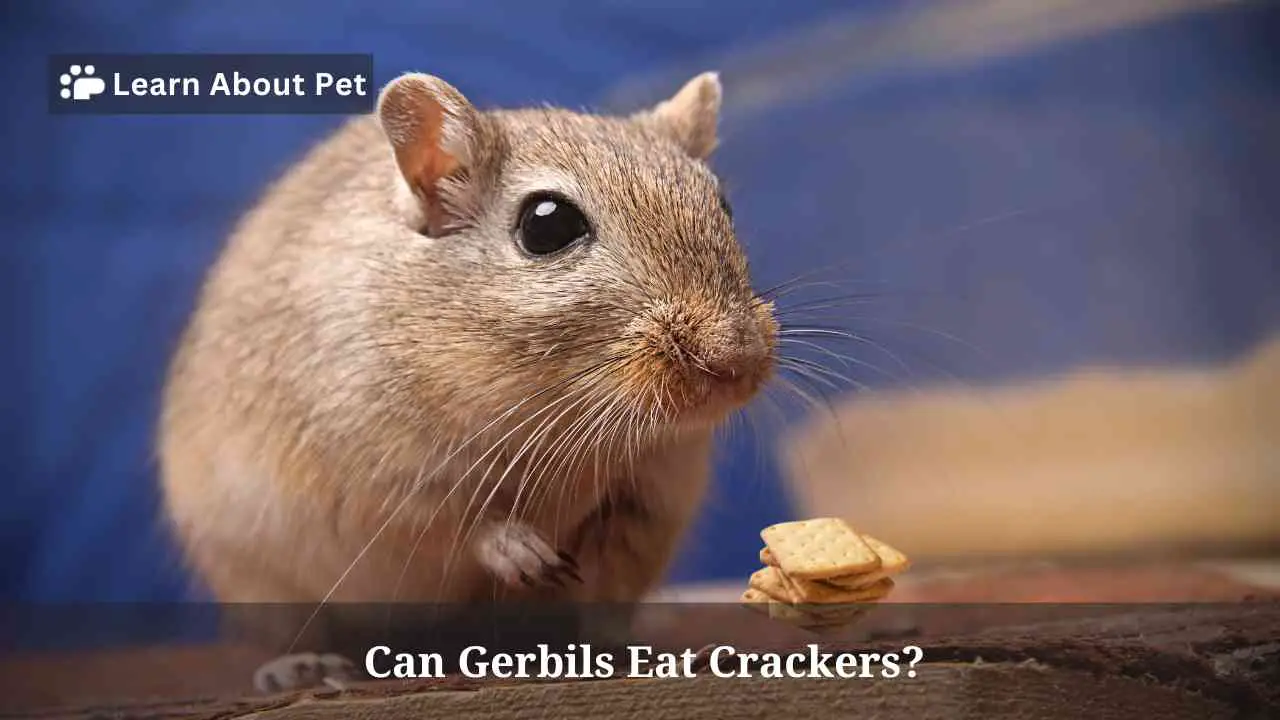Crackers are a highly enjoyable food for us humans, but can we share them with our beloved pet gerbils? This article has the answer.
Can gerbils eat crackers? Yes, gerbils may eat crackers once in a while. Wholegrain crackers, if available, would be better for gerbils. While feeding a gerbil on crackers, remember that the crackers have quite a bit of sugar, oil and salt.
Therefore, practice strict moderation. Crackers should certainly not become a staple or everyday food for gerbils, but just occasional treats.

Are Crackers Safe For Gerbils?
Crackers are quite safe for gerbils. Granted, the crackers do contain a bit of sugar, oil and even salt. But it is not so much as to render them completely unsafe for gerbils.
People do share crackers with their gerbils from time to time, with no real apparent problem.
Of course, the fact that the crackers have some salt, sugar and oil in them necessitates caution. One has to be very careful when feeding gerbils on crackers.
For one, the sugar, salt and oils in them means that eating too many crackers can cause stomach upsets in gerbils. That is in the short term.
Eating too many crackers regularly may make a gerbil overweight, while also giving it all manner of kidney, liver and cardiovascular problems.
Thus although the crackers are basically safe for gerbils, they should nonetheless be fed with great caution.
Focus should be on ensuring that the gerbils don’t eat the crackers very often. And even the few times the gerbils eat crackers, those should be dished very sparingly.
While feeding gerbils on crackers, you need to remember that you are giving the gerbils a ‘compromise food’. This is something that ideally the gerbils shouldn’t be having.
With that in mind, you can then observe great moderation.
Are Crackers Beneficial For Gerbils?
The main component in crackers is wheat. Now wheat is a food that can be good for gerbils, as they can derive some starch from it. There are also various minerals and even some protein in the wheat that makes crackers.
Therefore crackers can be somewhat beneficial to gerbils.
Can Gerbils Eat Crackers In The Wild?
Obviously no. There are no crackers growing on trees in the grasslands that wild gerbils can eat…
However, the main component in crackers is wheat. And wheat is a grass seed – akin to the grass seeds which make up the bulk of wild gerbils’ diet.
Thus when a pet gerbil eats crackers, its body is able to recognize the wheat in crackers. Then the gerbil’s body knows that the crackers are not an entirely alien food.
Do Gerbils Like Crackers?
Gerbils obviously don’t explicitly know what crackers are. But when you offer gerbils the crackers, they usually develop a liking for them.
Indeed, as you gain experience feeding gerbils crackers, you start to notice something interesting. You notice that some gerbils are really drawn by the crackers’ crunchy nature.
Can Gerbils Eat Crackers?
Gerbils have the capability to eat crackers. When offering a gerbil crackers, you don’t have to tell the gerbil that the crackers are food. The gerbil is able to tell, by its instincts, that the crackers are food for it.
As we saw, the crackers – when eaten sparingly – can be quite safe for gerbils. And as we saw, crackers – again when eaten sparingly – can be beneficial for gerbils.
Considering those facts, we can say that eating a few crackers now and then is alright for gerbils.
Can Baby Gerbils Eat Crackers?
Much depends on how young the baby gerbils in question are. If they are old enough to tackle tougher foods like crackers, then by all means they can eat the crackers.
But if the baby gerbils are too young, they may not yet be able to munch on the crackers.
Which Crackers Can Gerbils Eat?
In the market, there are many brands and types of crackers – including Goldfish crackers, Ritz crackers, Prawn crackers, Graham crackers… and so on.
What one may now want to know is which of these crackers gerbils can eat.
Can Gerbils Eat Goldfish Crackers?
Goldfish crackers can be alright for gerbils to eat sparingly.
What you must avoid is a situation in which you start sharing the Goldfish crackers with your gerbils whenever you are eating them.
While eating Goldfish crackers regularly may be alright for you, it isn’t for the gerbils.
But sparingly, and as very rare treats, Goldfish crackers can be somewhat alright for gerbils.
Can Gerbils Eat Ritz Crackers?
Some of the ingredients in Ritz crackers can be eyebrow-raising for sure, with regard to gerbils.
Nonetheless, if gerbils only eat such Ritz crackers in absolute moderation, and not too often, they should still be tolerable.
Can Gerbils Eat Prawn Crackers?
Eating Prawn crackers sparingly should be alright for gerbils. The gerbils will certainly enjoy the crunchy nature of the Prawn crackers.
Just remember that the ingredients in Prawn crackers may wreak havoc on a gerbil’s body in the long run, if the gerbil eats the crackers frequently and in noticeable quantities.
Can Gerbils Eat Graham Crackers?
People do sometimes feed their gerbils on Graham crackers, with no apparent problem – at least in the short run.
But there is no doubt that overfeeding on sweet and salty products like Graham crackers for gerbils can be problematic. That is especially in the long run.
Therefore if you give your gerbils Graham crackers today, mark the date. Then ensure that you go for a while, before giving them the crackers again.
Can Gerbils Eat Saltine Crackers?
Some of the ingredients in Saltine crackers may be troublesome for gerbils, especially if you take a long term perspective.
Nonetheless, if what you throw the gerbils’ way are a single Saltine cracker here and there, now and then, there should be no major problem.
Can Gerbils Eat Cream Crackers?
Because they come from fermented dough, cream crackers may not be the most ideal for gerbils.
What if you can’t resist the temptation to share the cream crackers with your gerbil? Then at least ensure that the gerbil doesn’t overindulge in them.
Can Gerbils Eat Crisps?
Considering the list of ingredients that go into the making of crisps, one wouldn’t exactly term them as a healthy food for gerbils.
If you have to offer your gerbils crisps, give it just a few. Then skip many days before ever giving the gerbil crisps again.
How Often Can Gerbils Have Crackers?
For gerbils, crackers should be very rare treats. If you can offer the gerbils crackers only once per month, this would be reasonable.
Remember, there is considerable sugar, oil and even salt in crackers.
Therefore you surely can’t be feeding your gerbils on crackers frequently.
How Much Crackers Can Gerbils Eat?
A single cracker per gerbil for a day may be enough.
For the bigger crackers, you may need to break it, and only give the gerbil half of it.
Final Verdict
Gerbils may eat crackers: sparingly, and as very rare treats.
Crackers are not very healthy for gerbils to eat. This is on account of certain ingredients in them: like sugar, oil and even salt in some.
Nonetheless, the temptation to share crackers with gerbils can be overwhelming. And given the cracker’s crunchy nature, gerbils tend to show great enjoyment in them.
There are certain wholegrain crackers that may be better for gerbils to eat. But even for those, there would be concern about the sugar, salt and oil/fat in which they are cooked.
Ultimately, if you have to share crackers with your gerbils, at least don’t make it regular. You can throw some crackers the gerbils’ way say, once per month or so.
Also ensure that a gerbil only eats something like one small cracker per day – or half a cracker for the bigger ones.

Welcome to Learn About Pet. My name is Rajkumar Ravichandran and I love all pets, travel, and amazing food. I write about my passion and personal experience caring for multiple pets in this blog! ❤️
Post Disclaimer
DISCLAIMER: THIS BLOG OR WEBSITE, "Learn About Pet", DOES NOT PROVIDE YOU WITH MEDICAL ADVICE AND IS NOT A SUBSTITUTE FOR MEDICAL ADVICE. ALWAYS GET IN TOUCH WITH YOUR PERSONAL VETERINARIAN AND USE INFORMATION HERE AS GENERAL ADVICE.
The information, including but not limited to, text, graphics, images and other material contained on this website are for informational purposes only. No material on this site is intended to be a substitute for professional veterinary advice, food recommendation, diagnosis, or treatment. Always seek the advice of your veterinarian or other qualified health care provider with any questions you may have regarding a medical condition or for pet food related questions.







